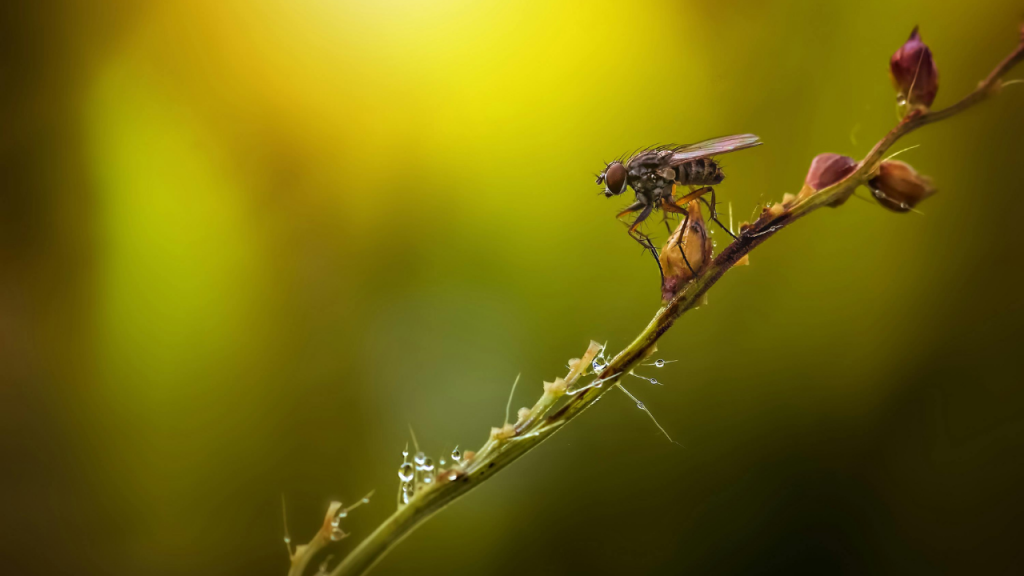Everyone knows the frustration of having to deal with houseflies, especially during the summertime. They seem to just be everywhere interrupting and buzzing about, especially when there is food around. In times like these you might be triggered to call pest control.
If you have not yet reached this point and do not necessarily want to expose yourself and your family to harsh chemicals. Here below we list why houseflies are drawn to our homes and ways to prevent them in your home naturally saving you both time and money.
Why are houseflies drawn to our homes? :
Known for their small set of single wings and grey colour houseflies are known as unwanted guests in many homes especially during the hot months. Houseflies vacate households due to the contents in them such as gardens and kitchens. Most kitchens and gardens contain waste thrown away from our food contents and if you have a backyard then the faeces of your domestic animal are highly likely to attract flying pests.
Houseflies are drawn to rotting material, faeces, and waste bins as they provide a great place to lay eggs, it is more advantageous to them if these areas are surrounded by warmth.
Are Houseflies harmful? :
Houseflies themselves are not harmful to humans and are rather just a nuisance. The harm that comes with the grey pests, is the bacteria and germs they carry based off their favoured habitats. Below is a list of diseases that we can get from housefly exposure:
- E. coli
- Tuberculosis
- Eye infections
- Typhoid fever
- Cholera
Houseflies prefer moist and warm areas, as breeding grounds meaning they are likely to fly around and touch areas that are contaminated to fulfil their needs such as laying eggs. Houseflies get into our homes likely through doors, windows, and tiny cracks around the house they are attracted to food contents and sticky surfaces. The eggs of houseflies are likely to hatch between 12-24 hours after being laid especially if the area is warm.
Ways to naturally get rid of houseflies:
Herbs and plants:
Certain herbs and plants can serve as alternatives to pesticide sprays and repel houseflies naturally.
- Venus flytraps: Venus flytraps are excellent plants to keep in your garden and inside the house. The Venus flytrap will traps any fly and insects that get close to them.
- Basil, bay leaves, and lavender: Herbs like basil and lavender are perfect to grow in the garden and keep around your kitchen and home. The smell of these will repel the houseflies and keep them away.
- Pepper and water: Use pepper or cayenne pepper to deter any flies from your kitchen by simply mixing the pepper of your choice in some water and place into a spray bottle. Spray the concoction around the area where the houseflies usually vacate.
- Eucalyptus oil: Add a few drops onto a clean cloth and place in the housefly-designated areas like the kitchen or anywhere you might be likely to eat and place near a window or door to keep the flies away.
- Dish soup and vinegar: Take a few drops of your dishwashing soap and some vinegar either white or apple cider vinegar, mix and place into a glass jar. Seal the jar with some plastic wrap then poke some holes. Houseflies will gravitate towards the smell.
Ways to prevent housefly infestation:
- Keep your house clean at all times this is the most important prevention. Houseflies are highly likely to thrive in dirty areas.
- After eating, make sure that you immediately wash your dirty dishes. Never leave dirty plates and food or leftovers in the open for flies to sit on.
- Make sure that you close your windows and doors at night and turn off any lights. Houseflies are drawn towards light.
- If you own a garden or domestic animal, make sure both areas are regularly cleaned and maintained, especially the areas where your animals are likely to relieve themselves.
- Make sure all vents or tiny holes in your home are properly sealed.
- Immediately place all your food contents in tightly sealed containers and make sure to place them in the fridge once you are done with them.
Houseflies are very bothersome but can be maintained with regular cleanliness and the natural steps listed above. These steps are especially important during the summer months.
ALSO SEE: Should you rinse your meats before cooking or freezing?
Feature image: Pexels

